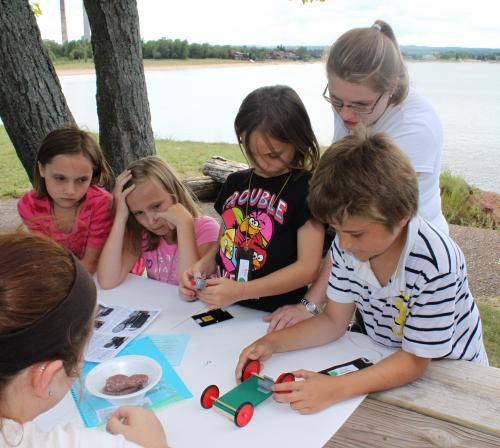Michigan 4-H builds on formal educational opportunities
Michigan 4-H helps communities learn hands-on, inquiry-based science solar energy and how these activities can build on formal education, out-of-school.
With school starting, parents are thinking about education and how to help kids succeed. Many Michigan counties are looking for leading-edge practices that will inspire youth. A great example is the TechXcite Solar Car Challenge at Life of Lake Superior (LOLS); a hands-on, out-of-school and inquiry based learning experience. The Duke University 4-H TechXcite curriculum is being piloted through Michigan 4-H.
This intergenerational design challenge, titled Racing with the Sun, has participants design and build a model solar car. Aside from learning more about s
- Engineering requires specific knowledge and skills above and beyond required training in the engineering field.
- Engineers need to be well rounded and understand the social context of their issue including the history, economics and environment relating to the problem.
- Engineers need to understand the importance of teamwork and the ability to work with others.
The Challenge was intentionally built based on the logic model outcomes created by the Children and Youth Institute of Michigan State University Extension. These outcomes include:
- Helping adult and youth leaders increase their confidence in providing experiential, inquiry-based science learning.
- Encouraging youth to apply problem solving, critical thinking and decision-making life skills.
A total of 57 adults, teen leaders and youth from Alger and Marquette Counties participated in the Solar Car Challenge. Adults and Teen Leaders indicated the following:
- 91 percent said they are more knowledgeable about the engineering and design process as a framework used by engineers to solve problems or challenges
- 91 percent are more knowledgeable about solar energy
- 64 percent are more knowledgeable about entrepreneurship and career opportunities that youth can pursue in engineering, design or solar energy related fields
- 70 percent said they plan to apply the science knowledge and skills they gained during the challenge
Similarly, after the Solar Car Challenge, youth learners indicated:
- 44 percent are more likely to become scientists or engineers
- 75 percent are more knowledgeable about solar or alternative energy
- 67 percent reported they are more knowledgeable about entrepreneurship and career opportunities in engineering and design fields
- 66 percent plan to apply the science skills learned at the challenge
- 87 percent recognize that engineers need to be well rounded and understand the social context of their issue including history, economics and the environment related to the engineering challenge
- 95 percent recognize that engineers need to understand the importance of teamwork and the ability of working with others
Science activities, like the TechXcite Solar Car Challenge, provided by MSU Extensions science team, are evaluated and meet current Next Generation Science Standards. They serve as a shining example of MSU Extensions belief that Michigan 4-H can build on formal educational initiatives and out-of-school programming. It is a commitment to:
- intentional science learning incorporated into traditional programming
- inquiry-based science
- outreach that uses social media and youth ambassadors, or leaders
- targets underrepresented youth
- staff training
- recruitment of partners from science-rich settings
- practical program evaluation
If you are interested in finding out more about how you can provide hands-on, inquiry-based science programming in your school or community, contact your local MSU Extension office.



 Print
Print Email
Email




